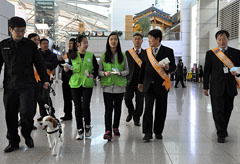From the "The Administrative Measures on Import and Export Food Safety (Consultation Draft)" to see the possible changes in Chinese imported food supervision
In order to deeply implement the important requirements of General Secretary Xi Jinping's "Four Most Strict" requirements on food safety, and to further improve the ability and level of import and export food safety governance, the General Administration of Customs (GACC) intends to optimize and improve the current import and export food management system. “The Administrative Measures on import and Export Food Safety (Consultation Draft)” (hereinafter referred to as the Draft), which is open to public consultation for comments on June 12, 2020. The deadline for comments is July 11, 2020. The “Draft” intends to make provisions on the general requirements of Chinese import and export food safety supervision, food import and export management, and corresponding measures and legal liabilities. If the “Draft” is officially released and implemented, Chinese import and export food safety supervision will undergo major changes. We combined with the “Draft” to interpret the possible changes in Chinese future imported food supervision.
1. Introduce the concept of "conformity assessment" and clarify the regulatory measures covered by conformity assessment
According to Article 12 of the “Draft”, the customs shall conduct conformity assessment on imported foods in accordance with the provisions of relevant laws and regulations on the inspection of import and export commodities. Moreover, the article stipulates the items that should be mainly included in the conformity assessment activities of imported food and introduces the concept of conformity assessment of imported food. As early as 2016, the former General Administration of Quality Supervision, which is now known as State Administration of Market Regulation, issued a manual on conformity assessment of imported food, but it was not publicly released.
The “Draft” clarifies the conformity assessment in the form of regulations and integrates the relevant provisions of 21 systems in the three major links of imported food supervision, which can further scientifically standardize the supervision of imported food.
2. Clarify the content and methods of the examination and evaluation of food safety supervision systems of foreign countries
Articles 14 to 21 of the “Draft” respectively stipulate the conditions, contents, examination methods, materials and application of the examination and evaluation of foreign countries by the GACC. Comparing with the "Measures", which only required the requirements of foreign countries, further refinement has been made in the “Draft”. This will give food safety regulatory agencies an important reference in countries and regions that intend to export food to China. Agencies can evaluate the feasibility of exporting food to China against these assessments. Furthermore, the “Draft” also serves as a reference for import food companies and overseas export food companies, especially when there are major animal and plant epidemics and major food safety issues in the country, it can help companies understand the content and procedures of the GAC’s examination and evaluation work.
3. Make it clear that the GAC can formulate and implement a video inspection plan
Articles 16 and 18 of the "Draft" stipulate that the GACC can formulate and implement a video inspection plan, and make provisions on the content, method and application of video inspection. This flexible inspection method is a great convenience to the supervision of imported food brought by the development of Internet technology. In addition, since the outbreak of COVID-19 in China in 2020, the epidemic situation in various countries is also spreading. According to the principles and procedures of scientific regulations, Using video to examine and evaluate the authenticity of materials, the effectiveness of the food safety management system, and the status of food safety, can greatly improve inspection efficiency, reduce inspection costs, and reduce unnecessary risks.
4. A pre-inspection system for imported overseas food before export was proposed for the first time
Article 27 of the "Draft" first proposed the pre-inspection system for imported overseas foods before export, which clarifies that the customs can implement pre-inspection on imported food before export and facilitate customs clearance based on the inspection results, which embodies of policies and optimizes the business environment. It is worth noting that the scope, procedures and requirements of imported food for pre-inspection are currently unclear. In the future, the GACC will announce the supporting documents and implementation. Foodmate will pay attention to the release of relevant documents and make interpretations in time.
5. Make it clear that the first-time imported food no longer needs to provide label proofs and translations.
Article 31 to 33 of the "Draft" clarifies and refines the detailed requirements of the accompanying documents, especially the supervision documents and certification materials. The “Draft” deletes the article that the first-time pre-packaged imported foods need to provide the label proofs and translations from the “Measures”, and make it clear that these documents no longer need to be provided. Foodmate believes that this is also a change made in accordance with the provisions of the GACC’s announcement No. 70 in 2019. From October 1, 2019, the GACC canceled the labeling requirements for the first-time pre-packaged imported food.
As one of the food inspection items, the label of imported pre-packaged food is inspected by the customs in accordance with the relevant laws and administrative regulations on food safety and inspection of imported and exported commodities. Domestic importers, overseas food production enterprises and exporters are responsible for the compliance of food labels.
6. Newly add clause to strengthen supervision and automatic detention of overseas food exports to China, as well as suspension and prohibition of import systems.
Article 68


 Industry news
Industry news
 Case
Case